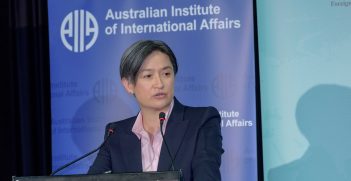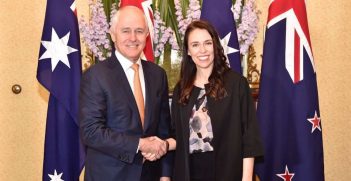Looking Forward: Australia and the Asian Century
To tackle the disruptive forces currently at play, Australia needs to be measured, confident and deeply engaged with its neighbours. To do that, we need to know who we are, what we stand for, and what our interests are.
It is for this reason that I have recently put on the public record how a Shorten Labor government would approach the values that would underpin Labor’s foreign policy and the national interests that would establish the direction of Labor’s foreign policy.
Contrast Gough Whitlam’s Singapore speech [to the Singapore Press Club in 1974] … with Foreign Minister Julie Bishop’s speech to the IISS in Singapore in March this year. Where Gough looked forward to a world to come, the foreign minister displayed nostalgia for a world that no longer exists—if it ever did. She failed to address the two central concerns in contemporary foreign policy.
First, how do we address the disruption that characterises the present global environment? How should we understand it? How should we respond to it? How do we contemplate the divergence between economic and military power as determinants of strategic power?
And second, what options does Australia have? If we are to rise above the purely transactional, something must be said about vision and direction.
For Australia to be successful in a time of disruption, we need to remember what works best for progressive and prosperous democracies like Australia, and to invest analytical and diplomatic capital in representing our values and realising our national interests. Our economic and security interests are best realised in a globalised world distinguished by an open trading system and a set of agreed rules whereby the international community conducts its business.
Open trading systems and an agreed international rules-based order do not just happen. They come about as the result of sustained and focused work, work that is both constructive and inclusive. While all nations are obliged to play by the rules, the hard reality is that some nations claim that there is insufficient inducement for them to adhere to a rules-based order that they are not part of constructing. Supporters of a workable international rules-based system need to recognise that the world has changed, that new powers are on the rise.
The present government displays a complacency and risk aversion that keeps national policy buried in the past. Despite our own best efforts, or perhaps because of our worst ones, we remain, as Donald Horne said, ‘the lucky country’.
So, where to?
A Shorten Labor government will build on Labor’s long and proud legacy in foreign policy.
That legacy includes the war-time leadership of Curtin and his turn to America at a time of existential crisis for the nation.
It includes the deep engagement of Chifley and Evatt in forging a new international architecture in the aftermath of WW2.
It includes Whitlam’s expansive, optimistic, outward-looking view of Australia’s place in the world, his opening to China and his activist approach towards international treaties and conventions.
It includes Prime Ministers Hawke’s and Keating’s recognition of the importance of Asia, their formation of APEC and development of deeper bilateral relations in the region.
It includes Gareth Evans’ formidable contributions, both intellectual and practical, over many years.
And, in the most recent period of Labor government, it includes the work of Prime Ministers Rudd and Gillard in elevating the G20’s role; advancing our traditional relations with countries like the United States and our developing relationships with countries like China and India; supporting international action on climate change; and significantly increasing Australia’s aid budget.
To channel Gough Whitlam’s remarks in Singapore all those years ago, it is Labor’s preference to maintain continuity where policy is appropriate and pertinent, and to change it where it’s not.
I am not one who supports bipartisanship for its own sake. But I am a very strong supporter of sound public policy that attracts bipartisan support. I would like to think that the White Paper Foreign Minister Julie Bishop has commissioned can attract bipartisan support. So it was in that spirit that I offered a few suggestions when I addressed the DFAT Heads of Mission in March. I also offered the drafters of the forthcoming White Paper a gentle warning.
I reminded them that the time of disruption in which we presently live reflects, in part at least, a growing dissatisfaction with the rules-based international order that has been part of the fabric of international economic and foreign policy since World War Two.
As the government’s White Paper comes closer to completion, I continue to recommend that it build on the sound policy initiatives that Julia Gillard’s Australia in the Asian Century advocated. I outlined them at the beginning of this presentation. We need an Asia policy more in tune with the confident and optimistic approach of the Asian Century White Paper than one which is diminished by trepidation or a preoccupation with the more transactional features of day-to-day diplomacy.
If the White Paper fails to build in the themes identified by Julia Gillard’s White Paper, it will simply fail as a guide to a transformational foreign policy.
And if first mover advantage lies with whoever sets the agenda, there are some additional items that need to be considered.
First, there must be renewed energy and vigour in negotiating international agreements to address the consequences of climate change. This has to be based on clear and evidence-based policy. As the global community becomes increasingly aware of the security dimension to changes in our climate due to global warming, Australia needs to work with insight and determination if our own long term security interests are to be protected.
Second, we need a China policy that begins with what China actually is, rather than through the lens of risk management. And we need a policy that looks at the Belt and Road Initiative (BRI) with an eye to identifying points of mutual interest and complementarity rather than reflexive negativity. We should be prepared to look at individual initiatives under the BRI and, where determined on a case by case basis, pursue those that accord with our national interests.
Third, we need an alliance policy built around shared interests in global stability, peace and security. Our relationship with the US is of paramount importance to us. We need to ensure that it is both sensitive to the changes underway in the Asia Pacific region and conducive to creating a more confident, vibrant and robust regional security dialogue.
Finally, we need to revisit our aid policy, re-establishing development assistance programs that deliver real benefits to nations that are struggling, especially in our own region (Timor-Leste, PNG and the South Pacific).
A transformational foreign policy is unachievable for so long as complacency, introspection and risk aversion remain the rallying points of the present government’s policy. Mediocrity, the comfort zone of the second-rate people of Donald Horne’s lament, is the enemy of imagination and innovation.
Australia has a bright future in Asia, but only if we are confident, constructive, collaborative and, most importantly, comprehending – comprehending of the remarkable diversity of Asia that is, of itself, such a positive and powerful generator of opportunity.
A 360-degree scan reminds us that, from the energies of Chifley and Evatt in assisting at the birth of the United Nations to the foresight of Julia Gillard in charting a course for Australia in the Asian Century, Labor has always approached the task of building and delivering Australia’s foreign policy future with confidence and imagination.
And you can rely on the fact that a Shorten government would maintain the Labor tradition of an engaged and proactive foreign policy.
Senator the Hon Penny Wong is the shadow minister for foreign affairs and a member of the Parliamentary Joint Committee on Intelligence and Security.
This is an extract of her address on 8 August to the Australia 360 conference, presented by the Coral Bell School of Asia Pacific Affairs in partnership with the Westpac Bicentennial Foundation. It is republished with permission. A full transcript of the speech is available here.





